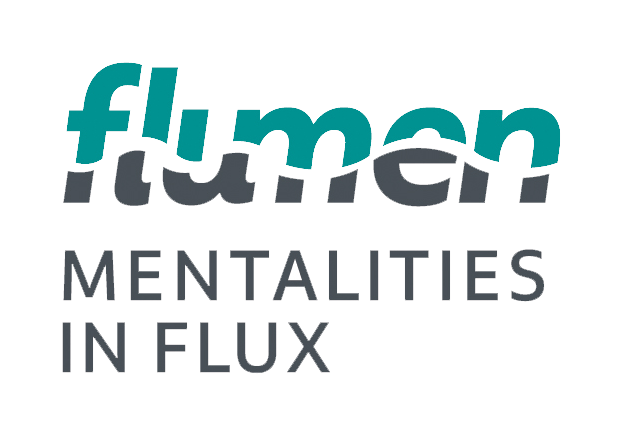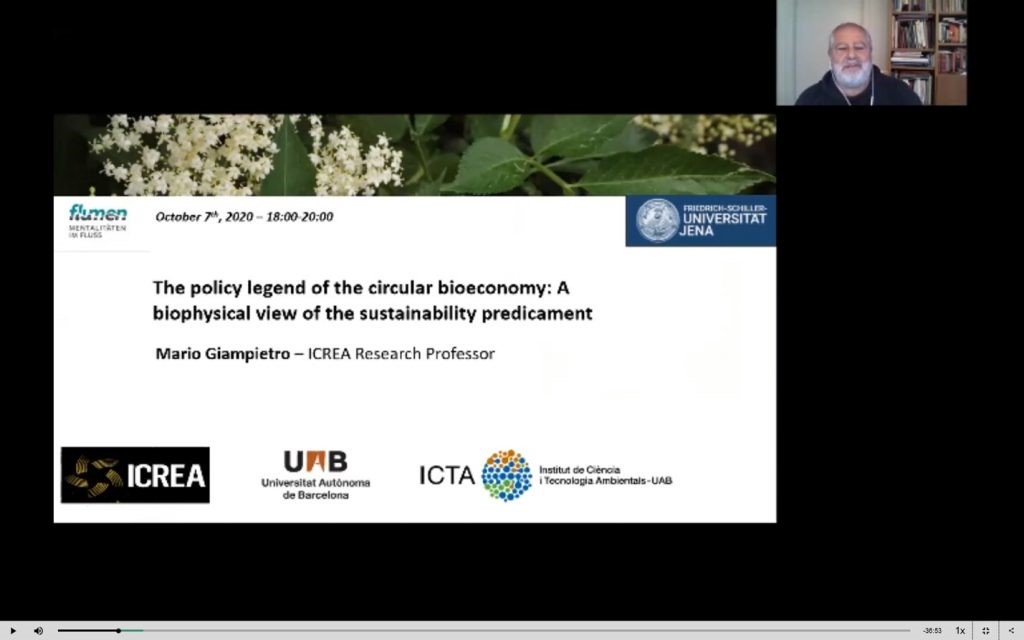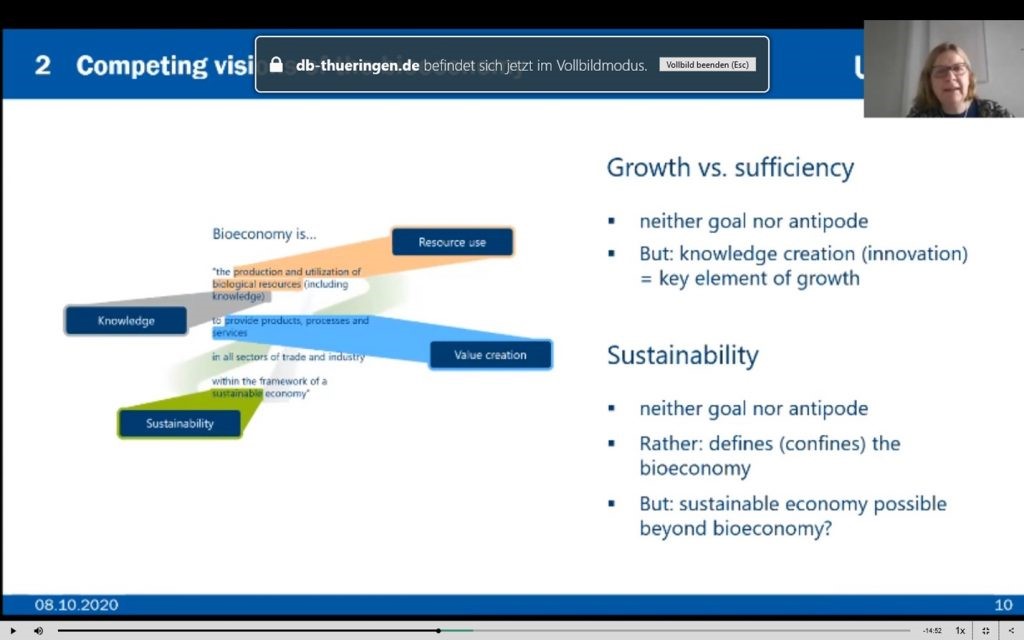


The contributions to the interdisciplinary workshop “It’s the (bio)economy, stupid! The future of growth and the promise of the bioeconomy”, 7th – 8th October 2020 in Jena, were diverse, many sessions dealt with topics related to the German bioeconomy strategy and its conceptual orientation and criticism, at the same time there were some contributions that took an international perspective on the bioeconomy. In all lectures, the contradictions and dilemmas inherent in bioeconomy with regard to the (im)possibility of sustainable economic growth were discussed.
The workshop also offered the social science oriented junior research groups funded by the German Federal ministry of Education and Research the opportunity to network:
“We as the BioKum research group benefited from the workshop insofar as we came into contact with many other topics that are relevant to bioeconomic futures and transformation processes. The critical look at the imagination of the circular economy, as portrayed by Mario Giampietro, brings new perspectives to our work and will certainly be a matter of concern for us. From my personal point of view, the discourse during the workshop showed that the bioeconomy is not a panacea for current social and ecological crises and that its definition is far from fully discussed. Critical scientific support is necessary here in order to meet the challenges of our time, such as climate change, social injustice, etc. Especially the different disciplines that came together during the workshop promise a lot of new findings.” (Jonathan Friedrich, BMBF junior research group “BioKum”)
With the exchange in the workshop, we received “interesting and constructive feedback on our own research project. Most of the discussions were about growth and positions of power. Various aspects were shown here, some of which were new to us. We were also interested in questions of transfer and social acceptance, such as how diffuse the understanding of bioeconomy in society is so far. The workshop helped us to gain new ideas and research approaches. We also benefit from networking – even though we participated online. We found the hybrid format very successful and will also take it with us as an idea in these times of the pandemic.” (Madalena Meinecke, BMBF junior research group “Food for Justice: Power, Politics and Food Inequalities in a Bioeconomy”)
Two exciting contributions can now also be heard and seen online:

Mario Giampietro, ICREA Research Professor, Institute of Environmental Science and Technology (ICTA) at the Universitat Autònoma de Barcelona: “The policy legend of the circular bioeconomy: A biophysical view of the sustainability predicament”, online lecture, October 7th, 2020. Moderation: Anne Tittor

Daniela Thrän, UFZ Helmholtz Centre for Environmental Research Leipzig, 2012-2019 member of the German Bioeconomy Council: “Bioeconomy’s Contribution to Economic Growth”, online keynote speech, October 8th, 2020. Moderation: Dennis Eversberg.
The two speakers took opposing positions:
As the title suggests, Mario Giampietro was skeptical of the idea of a circular economy as an essential element of a sustainable bioeconomy. From a bio-physical perspective, he analyzed the inputs and outputs in a bioeconomy that – as an energy and material processing system – is embedded in natural processes. To his opinion, a complete circular economy is not possible. A bioeconomy also requires a lot of energy (which today is mostly obtained from fossil resources) and there are always waste products that cannot be reprocessed. Furthermore, to operate the global economy with biomass, the available land on earth is far from sufficient. Conflicts over land are inevitable and have been carried out with violence for a long time in South America, for example. His lecture made it clear once again that technology, including biotechnology, cannot solve environmental problems if questions of social injustice and the unequal distribution of power are not asked at the same time.
Daniela Thrän, on the other hand, took a cautiously optimistic perspective. In her contribution, she outlined the achievements already accomplished (e.g. genome editing) and the potential for increasing productivity (more food from the same country) that improved biotechnology enables. In addition, she emphasized that in the German public and the bioeconomy debate, the topic of sustainability plays a much bigger role today than it did a few years ago. For example, the effects of steadily increasing production are also being critically discussed in the Bioeconomy Council. Her contribution stimulated a discussion about the benefits of technological gains in efficiency, if they were repeatedly “eaten up” by rebound effects and ultimately led to higher raw material and energy consumption. As Daniela Thrän explained, the problem of rebound effects in biotechnologically oriented research is considered to be the biggest question yet to be solved. However, it has not yet been part of concrete political measures. Also because many political measures relating to the bioeconomy are controversially discussed, Daniela Thrän advocates the support and processing of these negotiation processes through social science research.
More information and further presentations of contributions from the workshop are available on the flumen website.